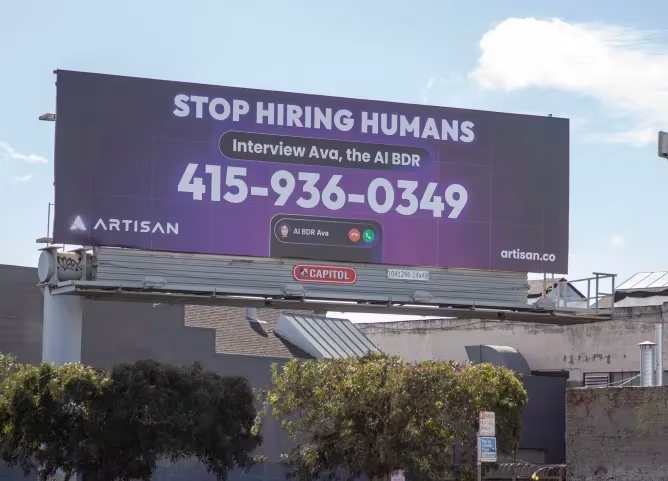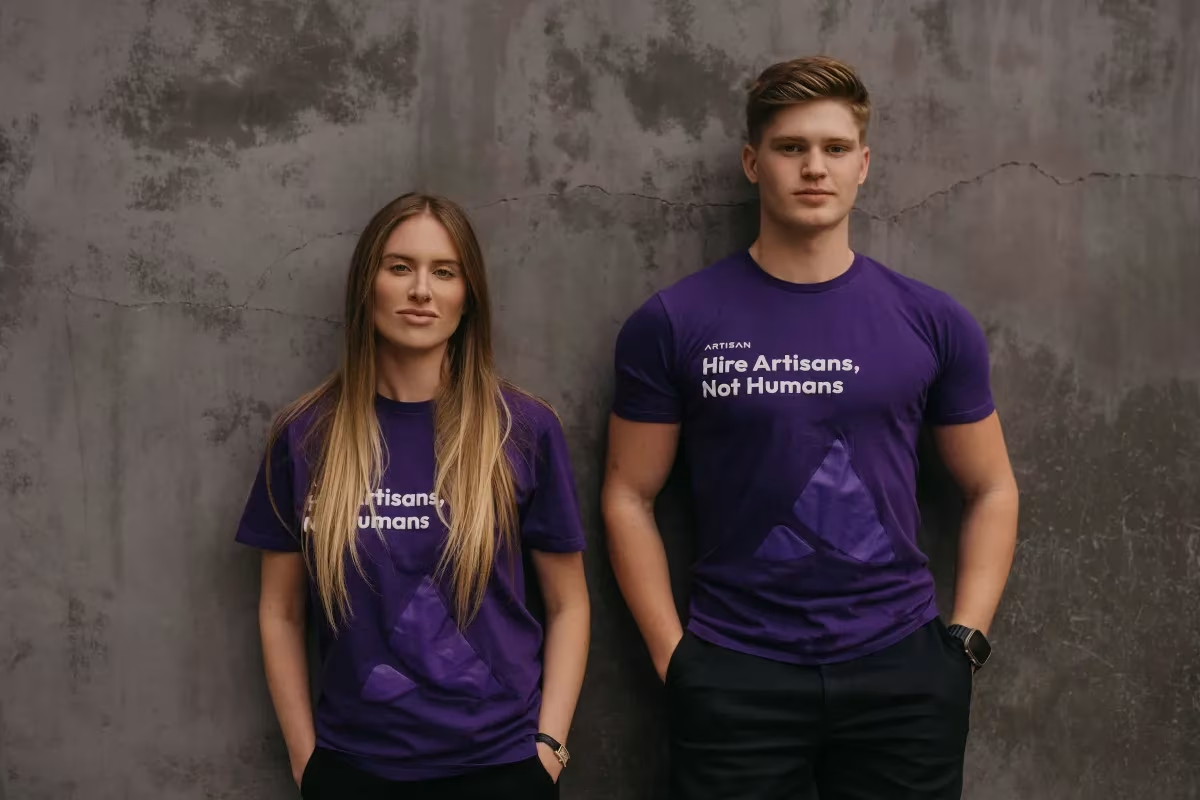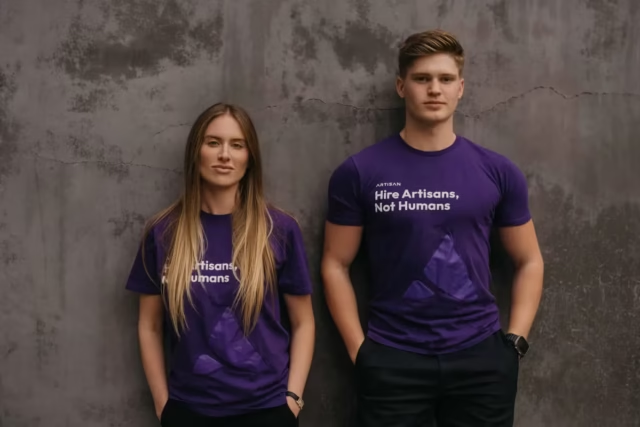Artisan Raises $25M: AI Startup Still Hires Humans
Sitting down as a 23-year-old really being heard all around, angry, and knocking all over his life space, carrying loads of weight that were interesting-a tough year for Jaspar Carmichael-Jack, founder and CEO of the AI sales agent startup, Artisan.
Speaking to TechCrunch in an exclusive, the CEO, Carmichael-Jack, reveals that Artisan has just raised a $25 million series A led by the famed Glade Brook Capital. Participating as well are Y Combinator, Day One Ventures, HubSpot Ventures, Oliver Jung, Fellows Fund, and others.
A year after, and Artisan was one of the most sought-after grads from the winter 2024 Y Combinator class, raising $12 million in September, one of the largest rounds of the cohort.

Well, according to Carmichael-Jack and his co-founder-30-year-old Sam Stallings-a former IBM product manager-there were a few early-stage chaos episodes in between.
Artisan is just one of those increasingly mushrooming startups in the very much watching AI sales development representative (AI SDR) market: it is probably best known as the one behind the “Stop Hiring Humans” marketing campaign, which has so far elicited a good number of news articles, social media posts and comments, and even a few death threats,” says the company.
Carmichael-Jack went so far as to announce his “resignation” on April 1, saying he was being replaced by an “AI CEO” as a response to the fallout from the campaign. It was an April Fool’s prank and Carmichael-Jack is still very much CEO.
More seriously, when asked if he truly believes that AI will replace people, Carmichael-Jack says, “No, which is ironic, because we did the billboards that said, ‘stop hiring humans’ but that was mostly just for attention.”
“Human labor becomes more valuable when you have the AI content,” he says. In fact, according to him, his company is hiring 35 humans and is out to get another 22-to fill positions that include sales, he says. It also just hired a new CTO, Ming Li, who came by way of Deel, Rippling, TikTok, and Google.
Churning customers
Like some others in the AI SDR market, Artisan, too, has suffered from customers quitting the product, Carmichael-Jack admits.
Entry-level sales seem to be such a prime application for agents gobbling up emails churning out cold calls. It is in its infancy-and has developed something of a bad name with respect to its wares.

The first-generation AI SDRs “get a pretty low response rate” and have “relatively high churn” among their customers, says Carmichael-Jack. “I just cringe in pain” when looking at the email pitches Artisan’s YC-era product wrote, he said. “We had extremely bad hallucinations when we first launched.”
But this year brought major changes for Artisan, which claims to have . Its flagship product, Ava, only hallucinates maybe one in 10,000 emails, if that, Carmichael-Jack adds. By working closely with model provider Anthropic, Artisan created tighter prompts. That won’t “leave room for hallucination, because it’s fed all of the information directly,” he describes.
Carmichael-Jack says Ava has now become good enough with which to count Artisan’s 250 companies as customers-and $5 million annual recurring revenue.
Artisan is also in the works of building two additional AI agent products: Aaron, which is designed to manage inbound messages, and Aria, its meeting manager assistant. Both expected launches will be completed by late 2025.
Won’t sell to everybody
The other sobering experience recounted by Carmichael-Jack is to say that not all companies are ready for AI SDR. There are entire industries, such as offshore development agencies, that Artisan will not touch anymore.
“Some customers will just completely flop,” says Carmichael-Jack, in reference to agentic outbound sales-they walk. Like its peers, Artisan also provides contracts with break clauses for customers’ early termination.

“We’ve historically sold to a lot of the wrong customers, learned that the hard way that it’s not just like a typical SaaS product, where you can sell to everyone-you have to actually qualify pretty heavily,” says Carmichael-Jack.
Some customers receive poor responses from Artisan agents whereas others get a flood of low-quality responses that force humans to do significant sorting to separate a few promising ones from the dead ends and the sweet spot, according to Carmichael-Jack, is about 1 percent response rate.
But Artisan is also one of the AI SDR vendors that learn how to target better their outreach efforts. As the sales automation industry has been doing for over a decade, AI SDR systems like Artisan and Actively AI are beginning to read and incorporate signals from social media posts, fundraising data, news stories, and such to better know who to target at all.
According to Carmichael-Jack, Artisan’s unique advantage is a proprietary database of brick-and-mortar businesses.
In addition, Artisan is addressing that blemish on the industry’s reputation by piloting a new flexible ‘success-based pricing’ option with Paid.ai. That’s the new agentic billing platform founded by Manny Medina, co-founder and former CEO of Outreach.

Now customers can use Paid.ai without locking themselves into a long-term contract but pay only depending on the number of unique responses.
“We should only really be selling to people if they get value from the product,” says Carmichael-Jack. “If we don’t get them value, then we shouldn’t be charging them money.”
Join the WhatsAPP community
Join Our Social Media Channels:
WhatsApp: NaijaEyes
Facebook: NaijaEyes
Twitter: NaijaEyes
Instagram: NaijaEyes
TikTok: NaijaEyes














![Mr Macaroni Drops Blistering Remark: ‘APC Filled with Most Corrupt People’ as He Slams Tinubu’s Controversial Pardon for Criminals=]] Mr Macaroni](https://naijaeyesblog.com/wp-content/uploads/2025/03/Mr-Macaroni-1-1-180x135.avif)

![Chaos Erupts in Abuja Hotel as BBNaija Star Phyna Sparks Fierce Scene Over Alleged N200,000 Dispute [VIDEO] Phyna](https://naijaeyesblog.com/wp-content/uploads/2024/11/A-Picture-of-Phyna-BBNaija-180x135.jpg)























